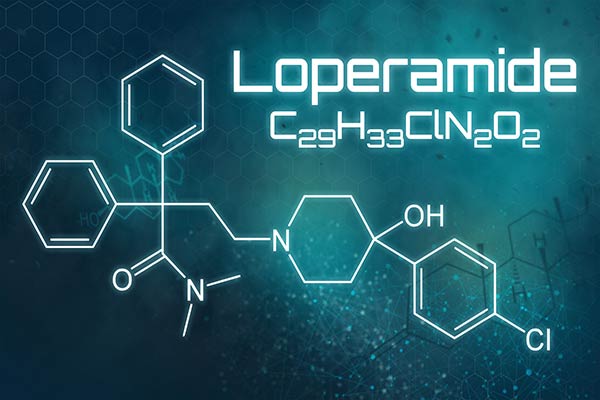Loperamide is an over the counter medication that controls diarrhea. It is also available in higher strengths with a prescription. Loperamide acts on the same opioid receptors in the brain as opioid-based drugs such as heroin or prescription painkillers but is not a true opioid. The National Institute on Drug Abuse does list Loperamide as an opioid drug; however, unlike other opioids, Loperamide does not cross the blood-brain barrier. Therefore, the effects of this opioid antagonist drug do not cause the same euphoria or high like other traditional opiates. In recent years, men and women suffering from substance use disorders have attempted to take extremely large doses of loperamide in hopes of achieving an opioid high. However, this instead leads to severe health complications and a high risk of overdose. 
How is Loperamide Abused?
NIDA reports that in the last two decades, Loperamide is abused mostly by opiate addicts attempting to diminish physical withdrawal symptoms that occur with opiate addiction. Loperamide is the active medication in name brand over the counter medications such as Imodium and Kaopectate and others. When abused, Loperamide has the potential to cause accidental overdose and cardiovascular toxicity (including racing heart and even cardiac arrest). “Loperamide is an over-the-counter anti-diarrheal medication that is available under brand names such as Imodium, Kaopectate 1-D, Maalox Anti-Diarrheal, and Pepto Diarrhea Control. Because it acts at mu-opioid receptors, which regulate movement in the intestinal tract, it is an opioid medication. There are reports of its being misused by drug users to stave off opioid withdrawal or possibly even to get high…Misuse of Loperamide has been reported since 2003.” (NIDA) When taken as directed, Loperamide is an effective anti-diarrhea medication. The recommended dosage to relieve diarrhea symptoms is 4mg (two 2mg tablets) followed by 2 mg (one tablet) every few hours and not to exceed 16 mg in 24 hours. Persons who are taking Loperamide for preventing opiate addiction withdrawal symptoms are taking upwards of 200 mg to 400 mg of Loperamide. In these large doses, users report that Loperamide does cause mild euphoria and will ward off opiate withdrawal symptoms.
High Doses of Immodium (Loperamide) Are Dangerous
Loperamide will not cause euphoric effects when taken as directed. Therefore, for people who are struggling with an addiction to opiates in their desperation, they will not flinch at taking such a high dose of Loperamide if it provides them relief. Ingesting Loperamide to relieve withdrawal symptoms and even to get high, is an indication of a severe addiction to opioids. Opioid addiction often continues for several years because, after only a few months of regular use, opiates cause physical dependence/addiction. Physical dependence/addiction to drugs means that the user will experience extreme physical withdrawal symptoms that cannot be tolerated without medication or more (opiate) drugs. Opioid withdrawal symptoms include:
- Cold and flu-like symptoms (sneezing, runny nose, fever)
- Diarrhea and vomiting
- Cold sweats and chills
- Severe insomnia
- Muscle spasms and body aches
- Agitation and anxiety
- Intense cravings for an opioid drug
- An inability to function- generally
The most common opioid drugs people get addicted to are heroin, Fentanyl, or prescription pain killers (Vicodin, Oxycontin, etc.). Since the onset of the national opioid epidemic, there has been more and more information available on the internet on how to prevent or cure opiate addiction withdrawal symptoms, and Loperamide is one drug that gets mentioned as a cure. Unfortunately, Loperamide will not end an addiction to opiates. What is most common for opiate addicts is that they use Loperamide when they have run out of their opioid drug and need relief from their withdrawal symptoms.
Can You Become Addicted to Loperamide?
Loperamide addiction is possible. Although it is not as potent as other opioid drugs, it can get a person high if they take massive doses. The most likely addiction present when a person is abusing Loperamide is an addiction to heroin, synthetic opioids, or prescription pain killers. When a person is regularly using Loperamide to ward off withdrawal symptoms or to get high, they must be treated for an addiction to opioids. The critical component that is necessary when a person decides to get professional help for their opiate addiction is a medically supervised detox. Medically supervised detoxification from opioid addiction provides safe medications that minimize and reverse the physical withdrawal symptoms that this addiction causes.
Get Help You Need With Opioid Abuse
Evoke Wellness at Miramar offers advanced medically supervised opioid addiction detox services. Clients are medically assessed by our physicians who specialize in opioid addiction and prescribed medications that prevent discomfort during their detoxification from opiates. Our medically supervised detox unit works directly with our opiate treatment center. All clients are encouraged to continue their recovery from opioid addiction and continue into one of our treatment programs.


